
by Janice L. Newman
On December 23rd, 1968, exactly eleven months after they were captured by North Korea, the crew of the USS Pueblo was finally released, and the world breathed a collective sigh of relief. The USA would not be starting World War III over the incident, and our boys, though they’ve been starved and tortured, are coming home alive for Christmas.
It is thus appropriate that this week’s Star Trek episode revolved around choosing peace instead of war.

Bill Theiss, you've done it again!
In the episode opener, we learn that the Enterprise has been sent to support Petri, Ambassador of Troyius, in his mission to “train” the Dohlman of Elas to be a suitable wife for the Troyian leader. The Dohlman turns out to be a beautiful woman played by France Nuyen, made up to look like Cleopatra in a bathing suit. Her name is Elaan, and she is imperious and demanding, while Petri is servile but contemptuous. They are intractable in their dislike of each other. Kirk quickly becomes exasperated with both of them, telling Petri, “Stop trying to kill each other. Then worry about being friendly.”
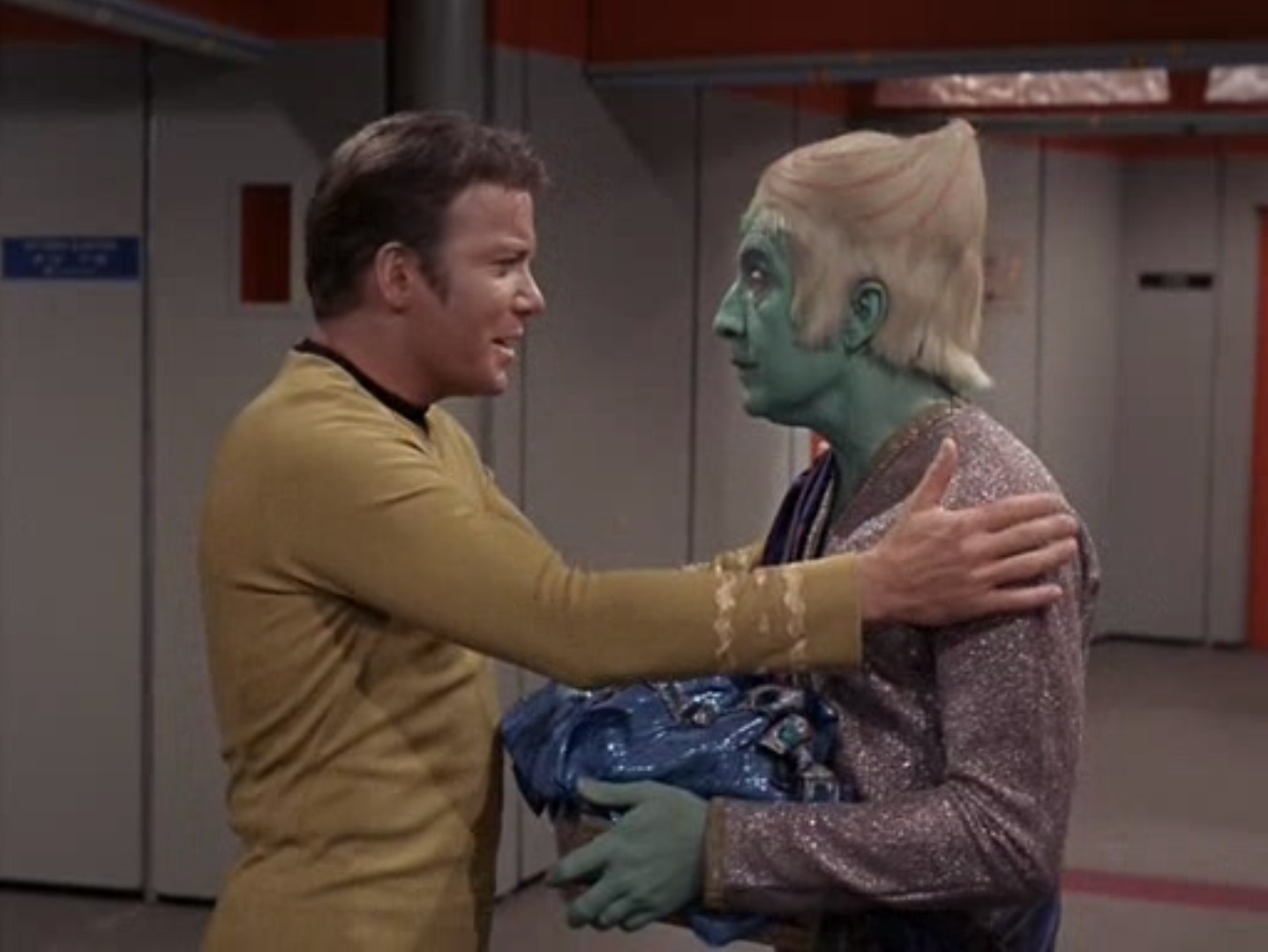
"And maybe try wearing a bikini…"
In the meantime, the Enterprise is being followed by a “ghost” ship, which eventually materializes and proves to be a Klingon warship. This is a nice callback to Balance of Terror, where the Enterprise played the part of the “ghost ship”, and the recent Enterprise Incident, where we learned that the Klingons now have cloaking technology.
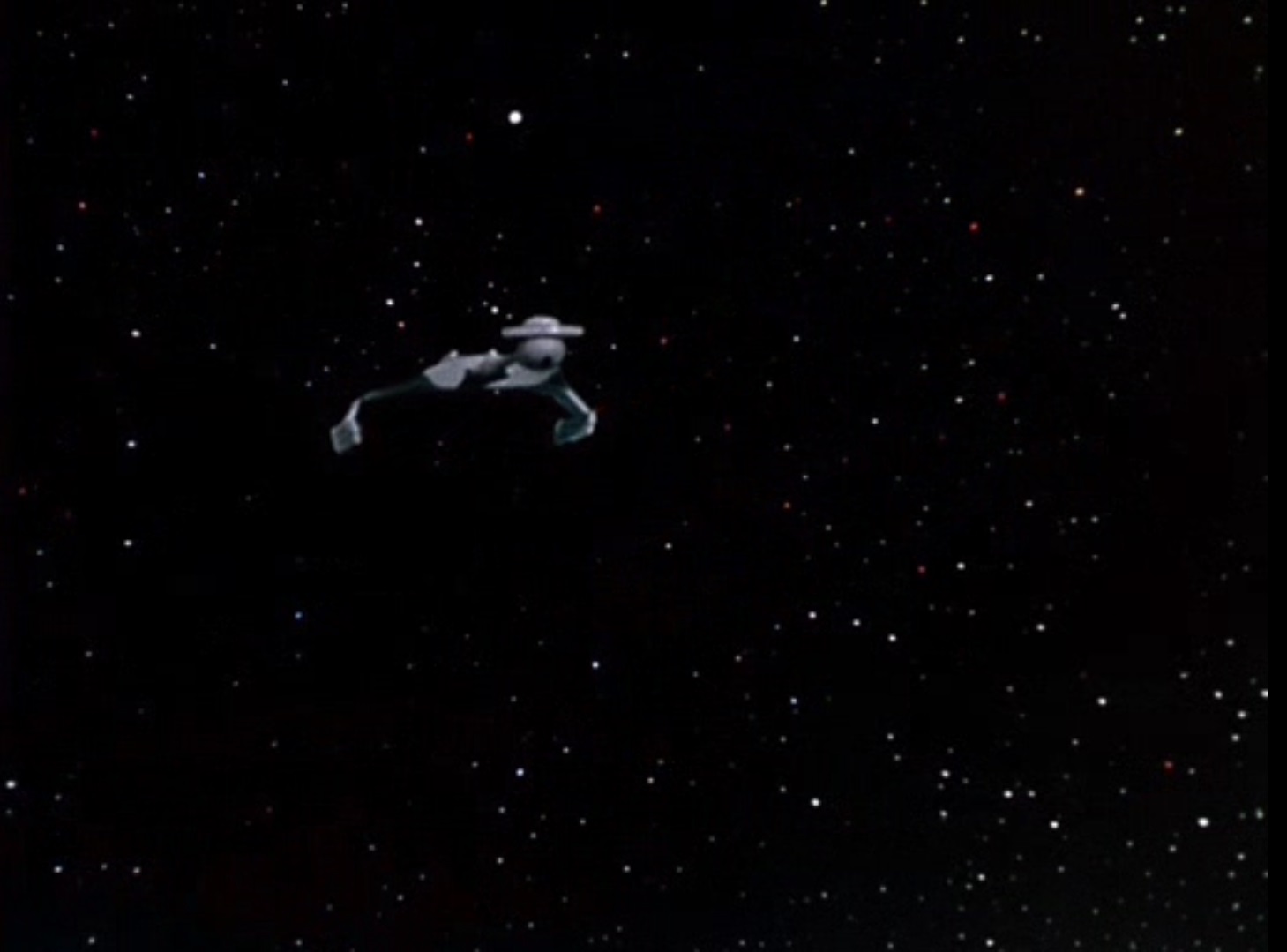
"Follow that starship!"
No sooner does the ship reveal itself than Kirk is called away from the bridge again. Elaan has stabbed Petri, who declares that he will have nothing more to do with her. He also explains to Nurse Chapel that the mysterious “allure” of Elasian women is merely biochemical: “A man whose flesh is once touched by the tears of a woman of Elas has his heart enslaved forever.”
Back in Elaan’s quarters, Kirk is fed up and declares that he will be Elaan’s new teacher. He tells her she is, “an uncivilized savage, a vicious child in a woman's body, an arrogant monster!”
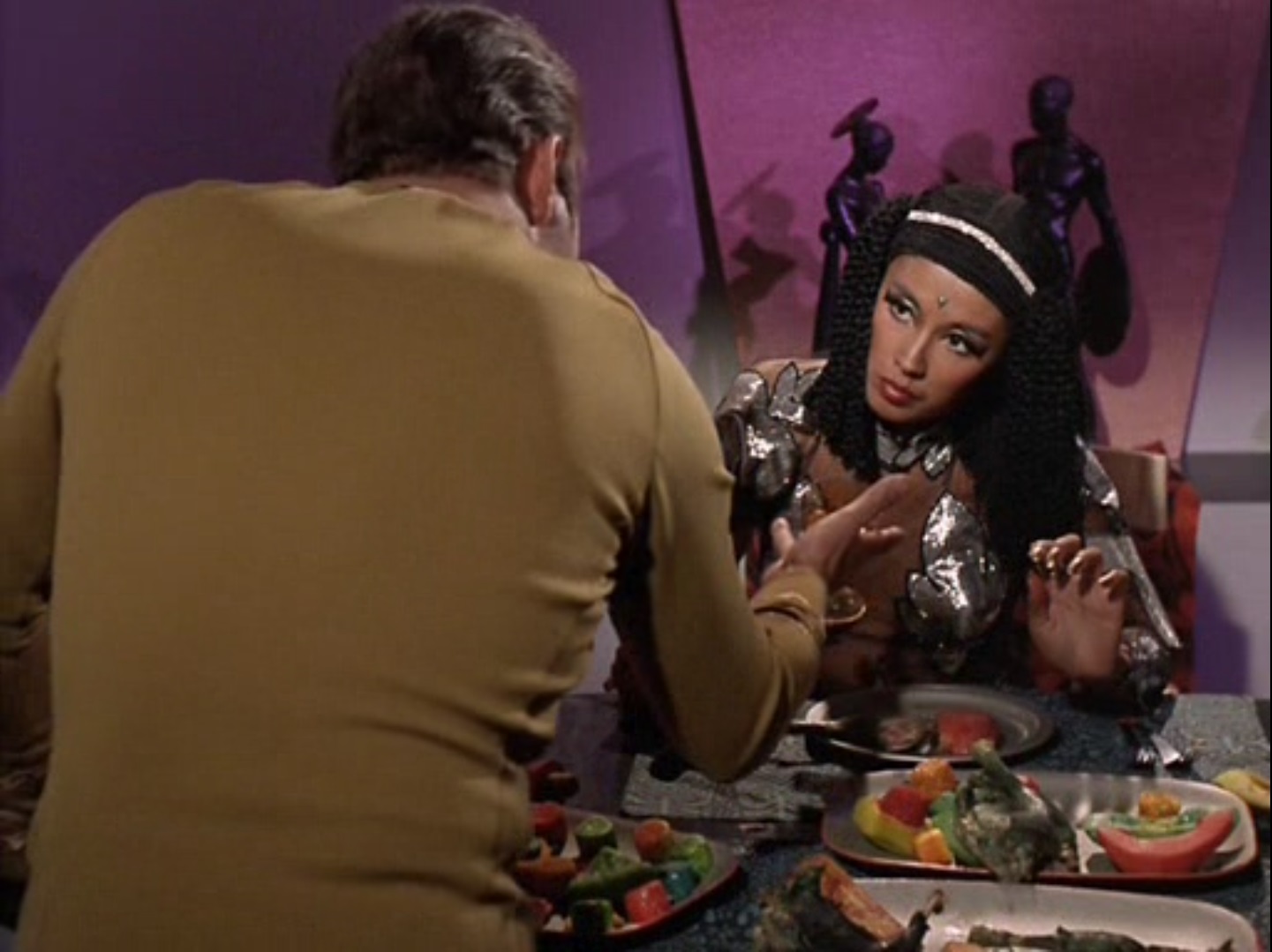
"I said, 'Gimme five'—you've got to learn modern courtesy."
I must admit, my sympathies were thoroughly with Elaan. Despite her imperious attitude in the beginning, it becomes increasingly clear that she has no choice in the political marriage and no desire to be married. At one point she says, “I will not go to Troyius, I will not be mated to a Troyian, and I will not be humiliated, and I will not be given to a green pig as a bribe to stop a war!” And yet, the Enterprise continues on its way to Troyius, regardless of her behavior, her orders, or her protests. It seems she has no true power, but is merely a pawn to be traded, and probably one the Elasians don’t actually care much about.
In fact, I had to wonder if the Elasians didn’t want peace at all, but sent their “Dohlman” to be married as a sop to the Federation. That way they could say they’d tried, and if the Troyians couldn’t handle the Dohlman, well that just proved that peace wasn’t possible between them.
This also nicely sets up the question of why the Federation cares so much about stopping the war between these two planets, to the point of bringing diplomatic pressure and sending one of their best starships to ensure that the wedding and negotiations go well. Scotty blatantly asks the same question in the episode opener, leaving it to rest in the back of our minds as we watch.
The next day, Kryton, one of the Elasian guards, sneaks into Engineering and sabotages the Enterprise. Kirk forces his way into Elaan’s quarters and again begins trying to “teach” her, which mostly consists of wrestling with her and threatening to spank her. She starts to weep, and he wipes away her tears. The effect is immediate, with Kirk’s ire evaporating and transforming into passion.

"Say, you didn't just hear a kind of snake rattle sound, did you?"
Kryton is caught, and kills himself rather than allow himself to be subjected to a Vulcan mind meld. Kirk orders Scotty to figure out what Kryton did, then returns to Elaan’s quarters. Elaan tries to convince Kirk to work with the Klingons, but he tells her there are more important things than love: “Elaan, two planets, an entire star system's stability depends on it. We have a duty to forget what happened.”
At this point, those of us who have been watching Star Trek since the beginning already know what’s going to happen: Kirk will always choose the Enterprise over everything else. And indeed, when Spock and McCoy come to roust the captain out of Elaan’s quarters, all it takes for him to leave Elaan behind is to hear that the Klingon ship has changed course and is approaching at warp speed.
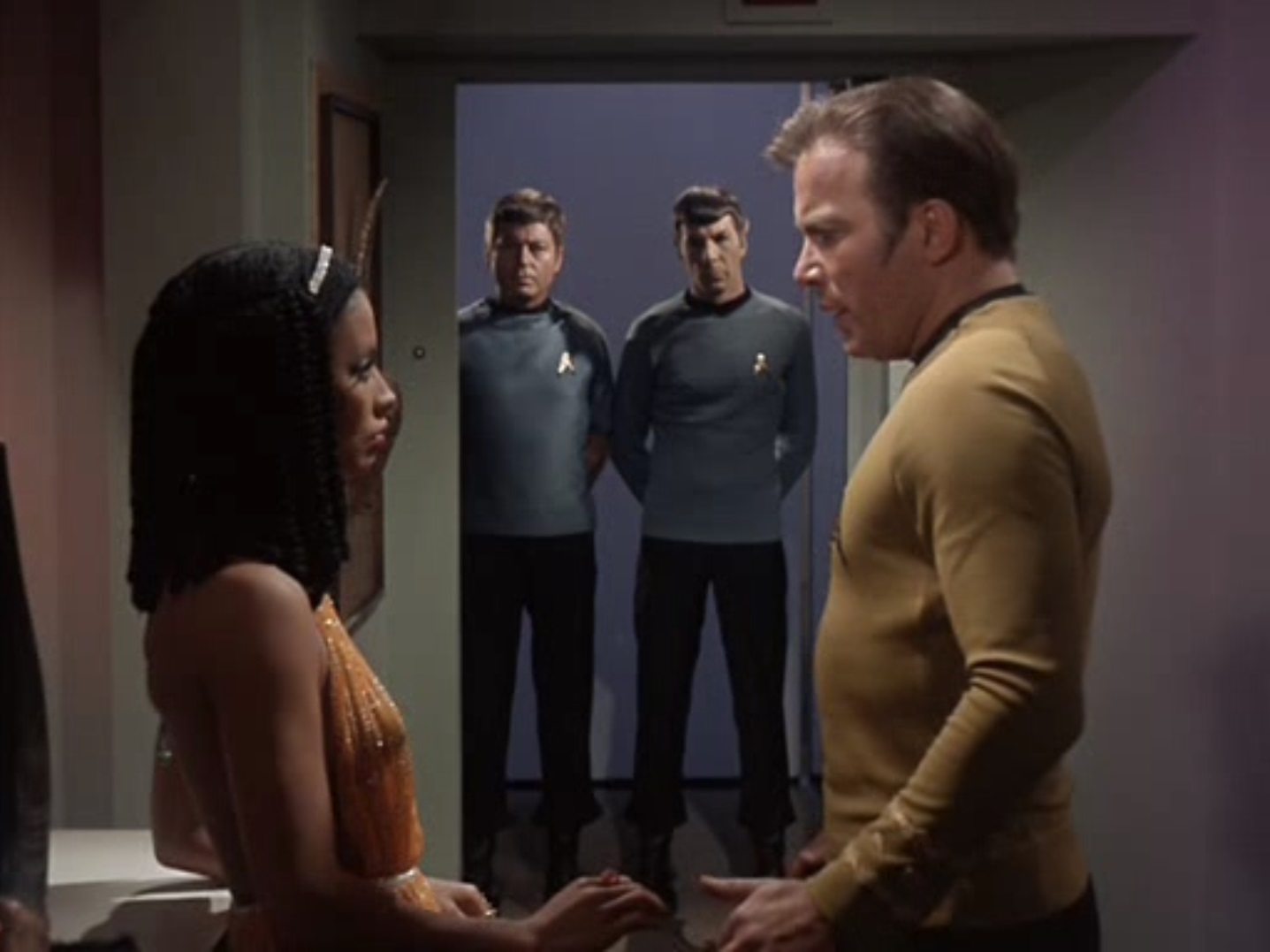
"Don't mind me. I always walk this stiffly when my friends are watching…"
Once Kirk gets to the bridge, we’re treated to one of the best combat sequences we’ve seen yet on Star Trek. Kryton’s sabotage, Kirk learns at the last possible moment, was rigging the matter-antimatter unit to blow if the ship went into warp. The Klingon ship therefore starts by trying to bait the Enterprise into going into warp, and that doesn’t work, just firing on them.
The captain sends Elaan to Sickbay because it’s the safest part of the ship. Petri speaks to her there, finally treating her with a modicum of graciousness and respect, and asks her to wear the necklace gifted her by the Troyians, “as a token of respect for the desperate wishes of your people and mine for peace”. She seems genuinely affected by the words and gesture, perhaps realizing that Kirk will truly never sacrifice duty for love.
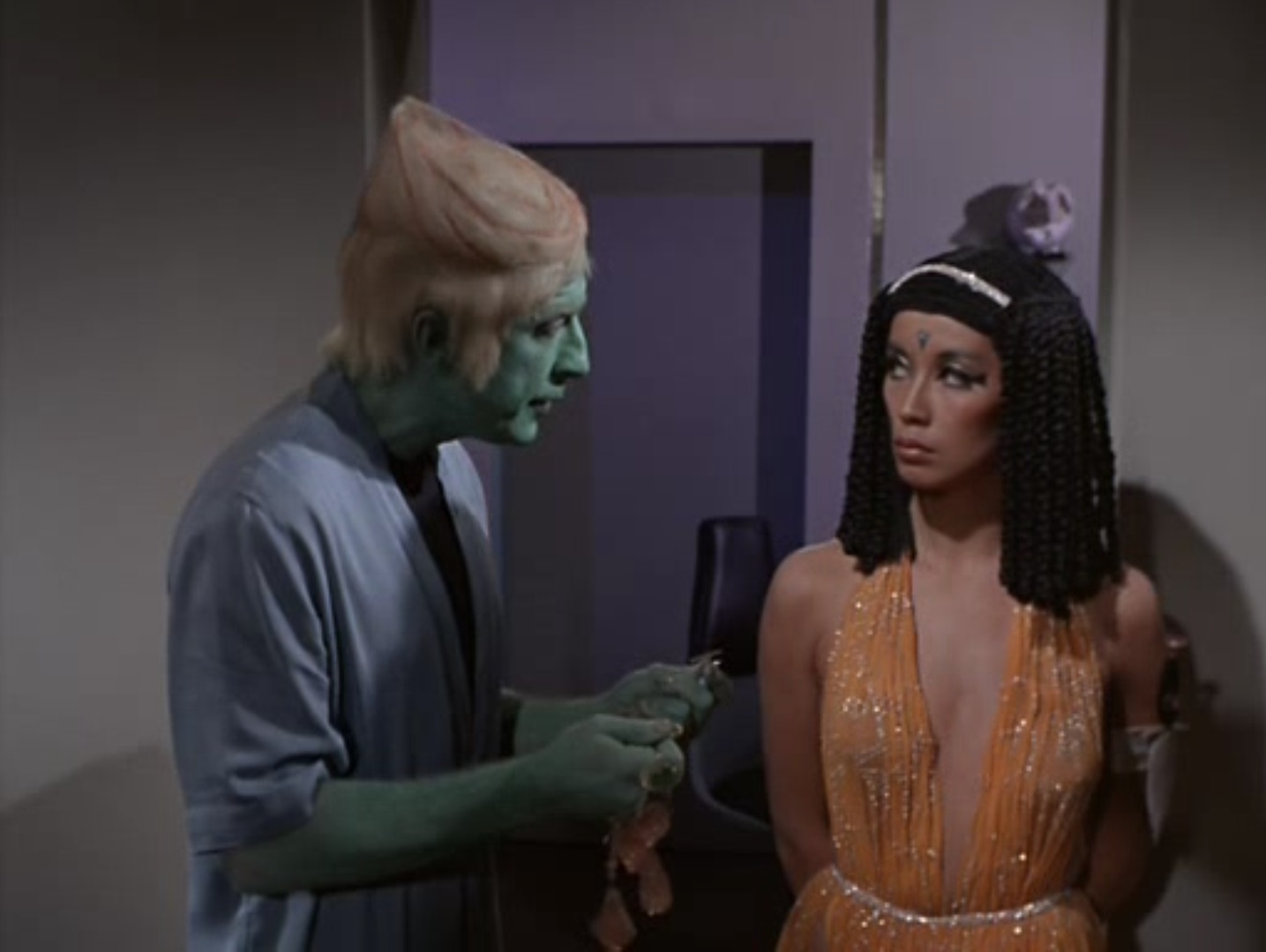
"Please put these on. The Emperor paid retail."
Back on the bridge, the crew struggles to keep the Klingon ship’s hits to its best shield (Kirk doing a bit of back seat driving as he leans over Sulu and gives him his orders). An impulse-power driven ship is no match for warp, though, and all seems lost.
Elaan appears on the bridge, wearing the Troyian wedding dress and necklace. Spock immediately notes that there are strange readings coming from the necklace. It turns out that the stones, which Elaan says are “common”, are dilithium crystals! (No wonder the Federation and the Klingons are both so interested in this system!) She gives them to the Captain, who has Spock hurry them down to Engineering, where he and Scotty start installing them. Kirk does his best to stall, but the Klingons are unwilling to discuss terms (I imagine that after “The Enterprise Incident” and The Deadly Years, the Klingons have been instructed not to listen to anything the Federation says—or at least nothing that Kirk says.)
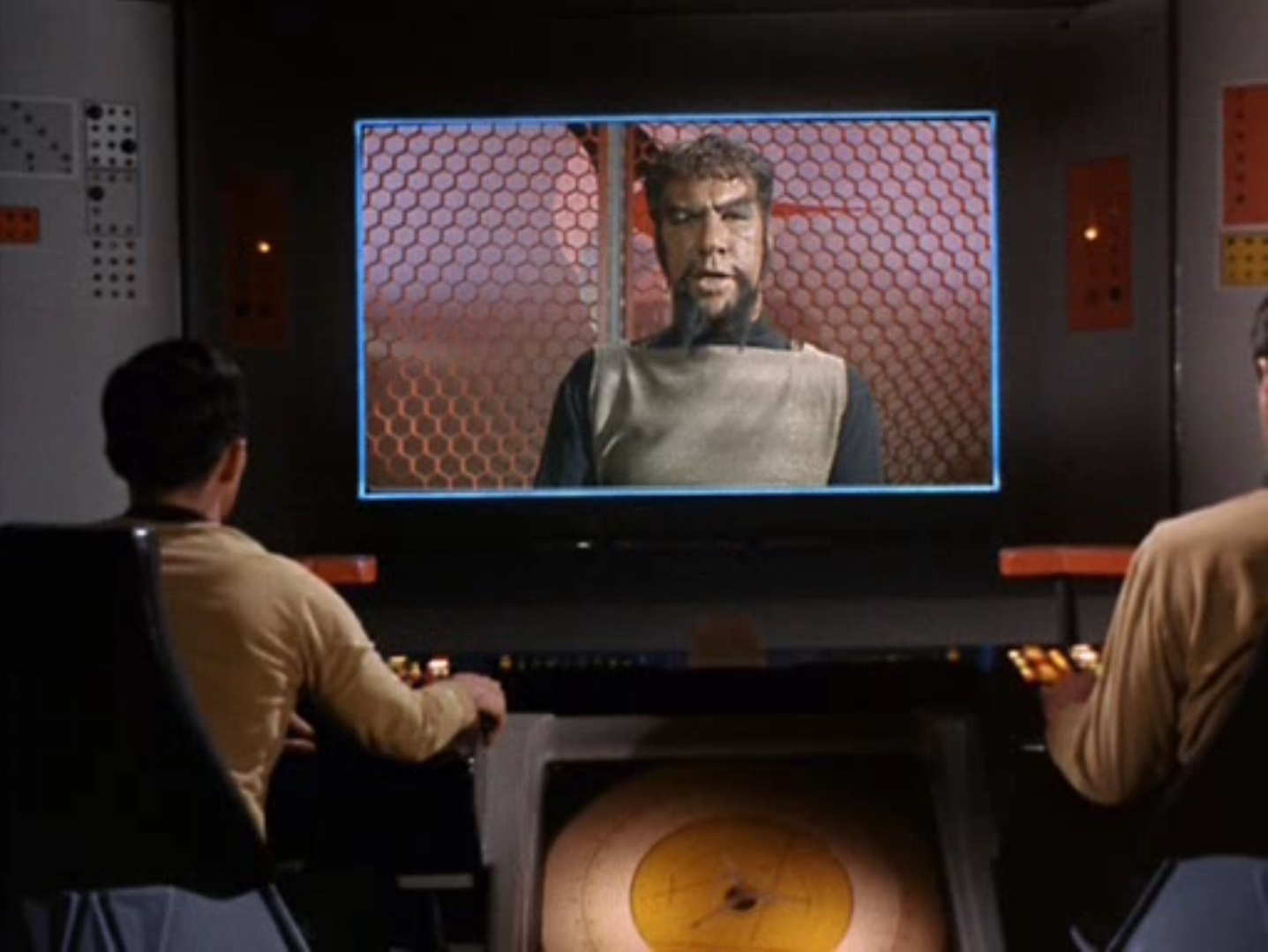
This fellow is no Michael Ansara. He's not even a William Campbell…
The crystals are ready in the nick of time. A photon torpedo at close range leaves the Klingon ship damaged and limping. The Enterprise leaves it behind to fulfill its original mission.
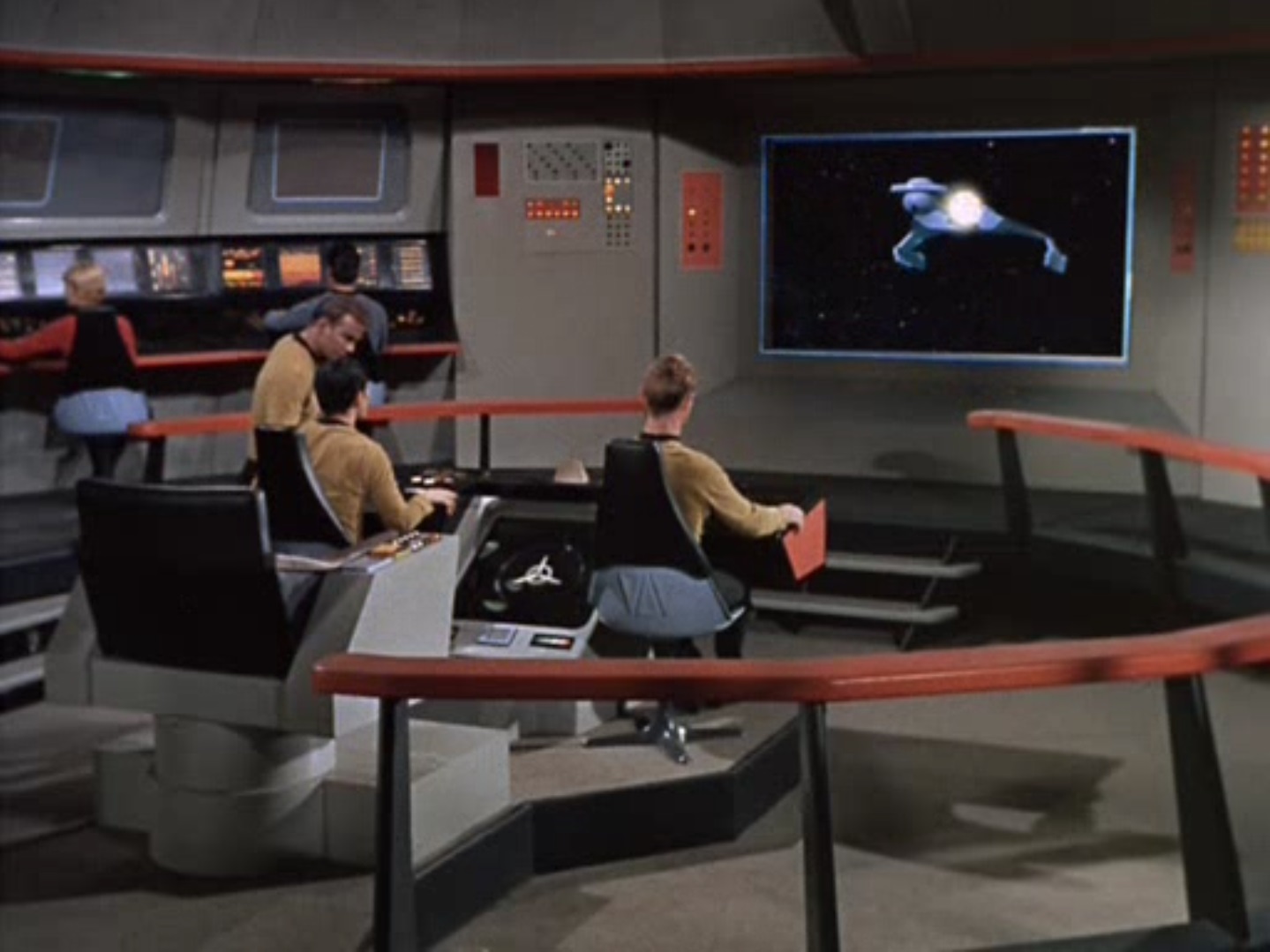
Pow! Right in the kisser.
Kirk says farewell to Elaan, who asks him not to forget her. He tells her he has no choice. Nor does she, she replies, only duty and responsibility. It’s clear that she’s come to accept her role, though whether it’s because she realized that her last desperate play to manipulate the captain failed or because her near-death experience made her decide that peace was more important than her personal feelings, we do not know. It is also worth noting that while she goes on to marry into a culture she despises and where she will likely be surrounded by people who hate, fear, and ridicule her (if Petri’s behavior is any indication), Kirk will simply continue doing what he loves. Her choice of “duty” over all else is thus, in my estimation, a far more difficult and admirable one.

"Oh, this knife? I was just going to pare my nails. Not kill the Emperor or anything like that, why do you ask?"
McCoy, unsurprisingly (given his track record) discovers an antidote to the Elasian tears. Spock tells him the captain has no need of it, as he’s already found his antidote: the Enterprise.
There were many things to love in this episode, and many things that frustrated me. The “Taming of the Shrew” sequences early on were grating, but the combat was excellent, and to the scriptwriter’s credit, the story did not end with Elaan being “tamed”. In the end, she makes a choice to accept her fate, but she does so with dignity.
The things I liked and didn’t like balanced out pretty well, leaving this a three star episode for me.

by Gideon Marcus
The Sum of its Parts
What I found so gratifying about "Elaan of Troyius" was its continuity with the Trek history we've encountered thus far. Once again, as in "Journey to Babel", the Enterprise is host to a diplomatic mission (though how the ship could house several dozen delegates to the Babel Conference, but Uhura had to give up her room for Elaan, is never explained). Once again, Kirk shows irritation at having to play nursemaid to a bunch of civilians. I would find his flip treatment of Elaan demeaning, but it's no worse than he displays to Commissioner Ferris or Commissioner Fox.
I particularly loved the galactopolitical situation depicted in the episode. Here we have a fairly new Federation system with two hostile planets, abundant with dilithium crystals, perched right at the edge of the Klingon Empire. What a fraught situation Kirk must navigate!
At first, it was difficult for me to glean the plot behind the plot, but by the end of the episode, the setup was pretty clear. The Federation, upon learning of the rich deposits on Elaas (and Troyius?) placed a clamp on all dispatches coming out of the system. Not good enough, though, as the Klingons clearly want the worlds badly, too. The Feds then explained to the two worlds in the system that they must work things out. Elaas grudgingly agrees—and then effects two simultaneous plans to queer the deal.
The first is Kryton's sabotage. By handing the Enterprise over to the Klingons, they get in their good graces (if, indeed, the Klingons have good graces). Obviously, the savage Klingons are a better fit for for the militaristic Elaasians anyway.
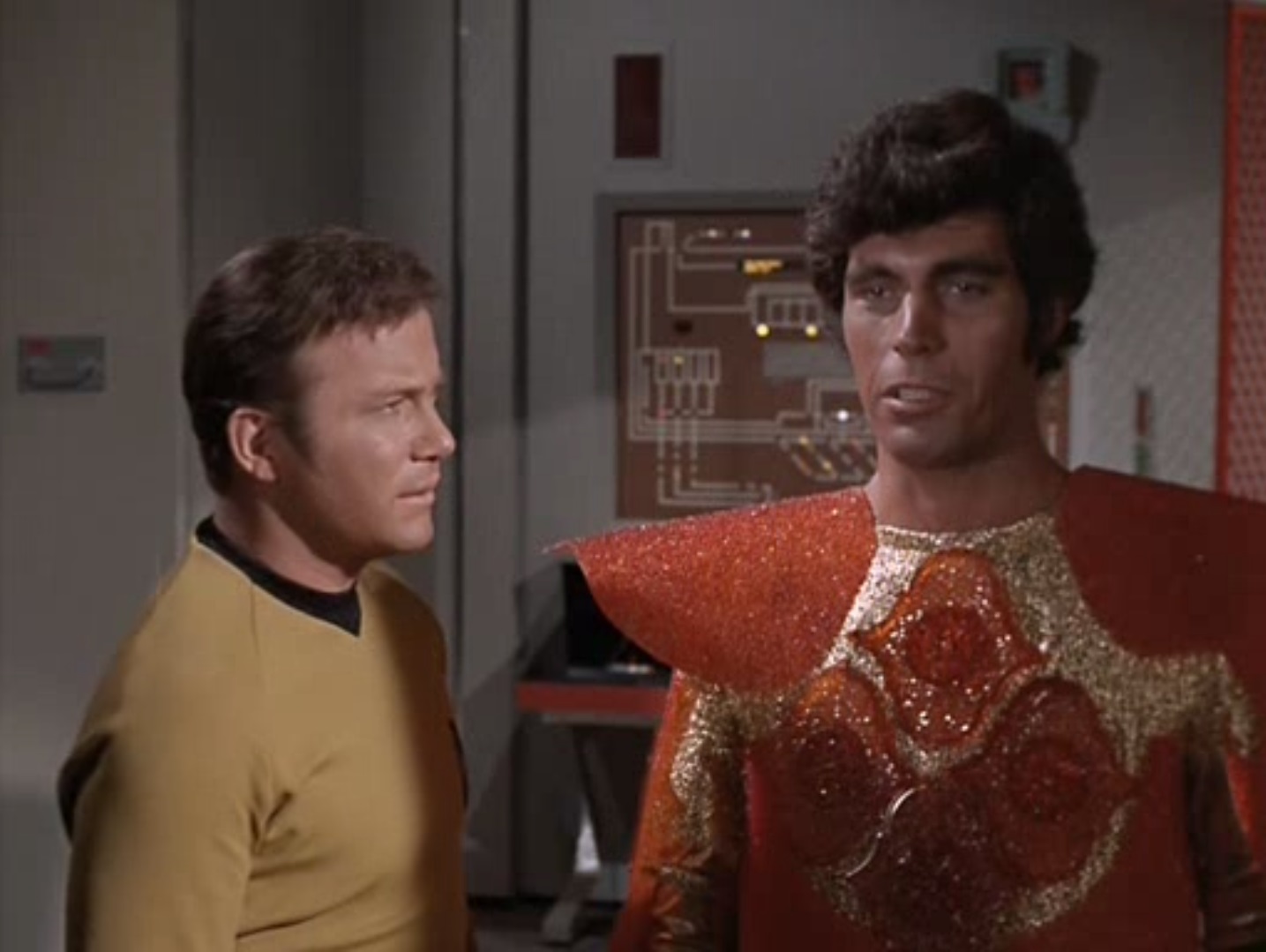
"Of course I want to be a Klingon—you think I want to keep wearing this outfit?"
The second is Elaan. She clearly doesn't want to be there. Indeed, she does everything she can to get out of it, despite orders from the Elaasian council. Elaan goes so far as to try to murder the Troyian ambassador and seduce the captain of the Enterprise. And yet, that scheme fails when Elaan takes a page from Kirk's book, and indeed the example of the whole crew, that duty and the preservation of life trumps all else. It's a quick, undershown change, but it's there, and I appreciated it.
The episode reminds me a bit of the parable of the peasant woman who shelters a starving prince. The royal promises to give a gold coin for every fat bubble in the soup she serves. Greedily, she dumps a huge pat of butter in the soup, which results in one big bubble rather than a myriad of little ones. Similarly, if the Elaasians had stuck to just one plan, they might have succeeded. Instead, they double hedged and lost all.
And was the Klingon commander operating with Imperial sanction? Or was he a rogue skipper with notions of glory? After all, taking on a starship seems pretty bold given the ever-watchful Organians.
It's not a perfect episode, but it's certainly an engaging one, and I always enjoy seeing Mrs. Robert Culp on the small screen. Plus, her appearance alongside Shatner is something of a reunion—they starred together in the Broadway version of The World of Suzie Wong. Plus, I dug both the Klingon ship (which we saw a bit of in "The Enterprise Incident" and "Day of the Dove") and the score for the episode.
Four stars.
Twixt Scylla and Charybdis

by Trini Stewart
The beginning of this week's episode did not seem promising to start, mostly because of the guest characters' first impressions on me. Petri the ambassador seemed childish and reckless in his peacemaking, and Elaan was almost comically uncooperative for royalty sent as a hospitable offering. Looking back, Elaan was possibly playing to her strengths to some end with her antagonistic reactions, and her development with Kirk ultimately became a gripping trial for our captain.
Kirk was the shining star of this episode, which is not something I feel about him often. He was impressively quick-witted against biochemical and psychological manipulation, which really sold his captain qualities for me more than his usual speeches or fights. The way Kirk kept his priorities in check while thinking on his feet reminded me of how Spock left me feeling in "The Tholian Web" when he held the ship together without Kirk. In the short time I have known Kirk, he has struck me as the type to always know what to say and fight when there is no other choice. Kirk managed to unravel the layers of the princess's antics even with serious disadvantages, revealing what his problem solving is like when he is out of sorts. Tension was well-built in this episode on several levels, and the challenges Kirk faced were arguably more dynamic and interesting than Spock's in "The Tholian Web".

"What's a case of tight trousers when the Enterprise is at stake?"
Kirk transitioned from acting as a respectful host to a firm authority with Elaan, and his initial responses to her rude behavior were tastefully poised. Once Elaan had seduced Kirk, he still managed to expertly dismantle the Elaisians’ schemes without falling for the Dohlman or her subordinates’ clever tricks. Shatner did a great job conveying how difficult it was for Kirk to maintain his composure, so it was riveting to see just how he would escape the Klingons, prepare the guileful Elaan for her marriage, and get the Enterprise back in ship shape under that level of duress. His allegiance to the Enterprise evidently sobered Kirk; his articulate maneuvering reflected his symbiotic relationship with the ship and her crew. In the end, even Elaan was humbled by our captain, finally submitting to the responsibilities her title bore. I was quite pleasantly surprised by Kirk this week, and the adversities threatening the crew were positively captivating. 4 stars!
Be Our Guest, Do As You Please

by Joe Reid
“Elaan of Troyius” was this week’s episode of Star Trek. “Taming of the Shrew” storyline aside, there is one thing that the writers of Star Trek keep doing to twist my britches, and this episode was another example of it. The Enterprise, powerful symbol of human achievement, has the laziest security imaginable. Episode after episode, people that wish to do harm to the ship and its crew need only to walk into what should be the most secure areas of a ship to do as they please practically unchallenged. Areas that on large ships, not all members of the crew are even allowed to enter. So, let’s delve into some of areas of a ship that guests should not enter.
Let’s begin with the command center of the ship. The bridge. The seat of command, where the captain steers the destiny of a ship to complete its missions. Obviously, a perfect place for a teenage princess to casually enter whenever she chooses. Elaan pierced the bridge and interrupted the ship’s captain, while he was in the middle of a combat situation. Good on the writers for making the captain, thanks to Spock’s urging, send her away from the bridge, only to have her show up on the bridge again after a change of clothes. For an area holding some of the most senior members of the crew, it seems unusual that it wasn’t better protected. Past episodes showcased singing children, enemy androids, and furry tribbles having free access to the brain trust of the Enterprise. I anticipate that 15% of Kirk’s problems could be solved by securing access to the bridge to “Bridge Crew Only”.
The next ludicrous pattern that we witnessed in this episode was the open and unguarded access that guests on the Enterprise had to Engineering, the area of the ship that provides all the power, without which the Enterprise couldn’t move, fight, or support human life. Why did Elaan’s former suitor have a free ticket to stroll into this most vital part of the ship and sabotage systems? Again, good on the writers for allowing him to be discovered, be it many minutes later, only to allow the discoverer to be summarily executed for his weak efforts to question someone he'd found messing with the thing that keeps the ship alive. If only this random trespass in Engineering were rare. Previous episodes sported children again, along with genetically advanced conquerors, self-aware talking space probes, and Klingons traipsing merrily into the bowels of Engineering.
Where before I said that 15% of Kirk’s problems could be solved by securing the Bridge, 99% of problems could go away if Engineering had a couple guards working shifts to protect the very heart of this starship.

If only Kevin Riley were on duty, none of this would have happened. So long as he's sober…
Historically there have been some areas of the ship that have been kept secure week after week. Areas that no one can casually walk into without permission (unless you are a floating cloud of space gas that is). Those would be crew quarters. Even in this week’s episode, crew quarters were better guarded, and their doors are better respected, than what should have been the most sensitive areas of the ship. Not even Spock and McCoy could casually walk into the room where the captain was passionately kissing Elaan.
Perhaps future episodes will take the security of the most critical parts of the ship more seriously. That, or have the crew consider moving the engines and bridge staff to crew quarters, where doors are respected.
For continuing to overlook this easily solvable problem, I offer only 2 stars for “Elaan of Troyius”. Ignoring the fact that the episode did display some interesting makeup and costumes, and featured a few well-acted scenes, the continued stupidity of the security of the ship is as untenable as its “secure” areas.
Two stars
[Come join us tomorrow night (January 3rd) for the next thrilling episode of Star Trek! KGJ is broadcasting the show live with commercials and accompanied by trekzine readings at 8pm Eastern and Pacific. You won't want to miss it…]
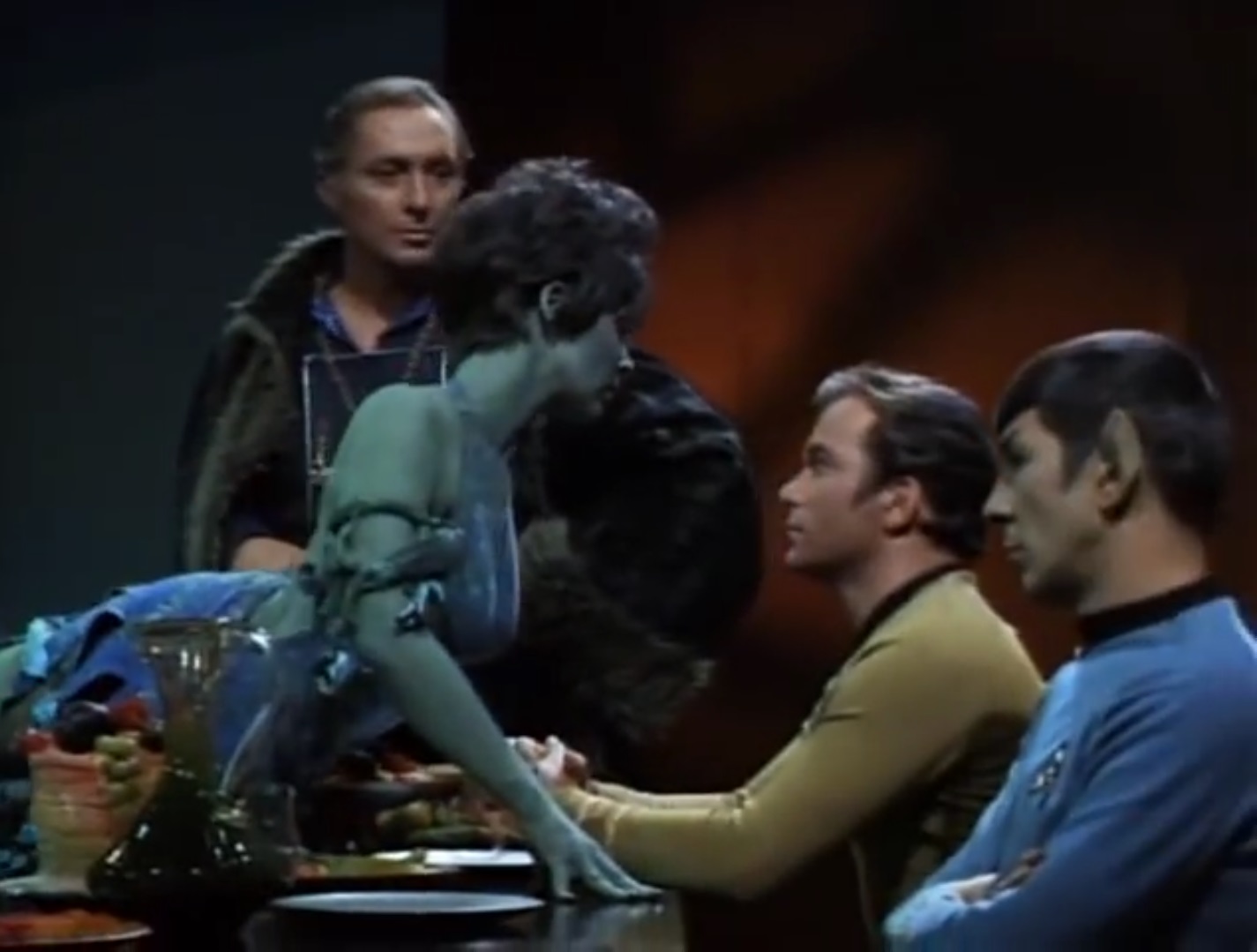




![[June 12, 1969] Heavy on the Bitters (<i>Star Trek</i>: Turnabout Intruder)](https://galacticjourney.org/wp-content/uploads/2024/06/690610title-672x372.jpg)
![[January 2, 1969] Blood, Sweat, and Tears (<i>Star Trek</i>: "Elaan of Troyius")](https://galacticjourney.org/wp-content/uploads/2023/12/690102title-672x372.jpg)



















![[December 20, 1968] A failure to communicate (<i>Star Trek</i>: "The Empath")](https://galacticjourney.org/wp-content/uploads/2023/12/681220title-672x372.jpg)
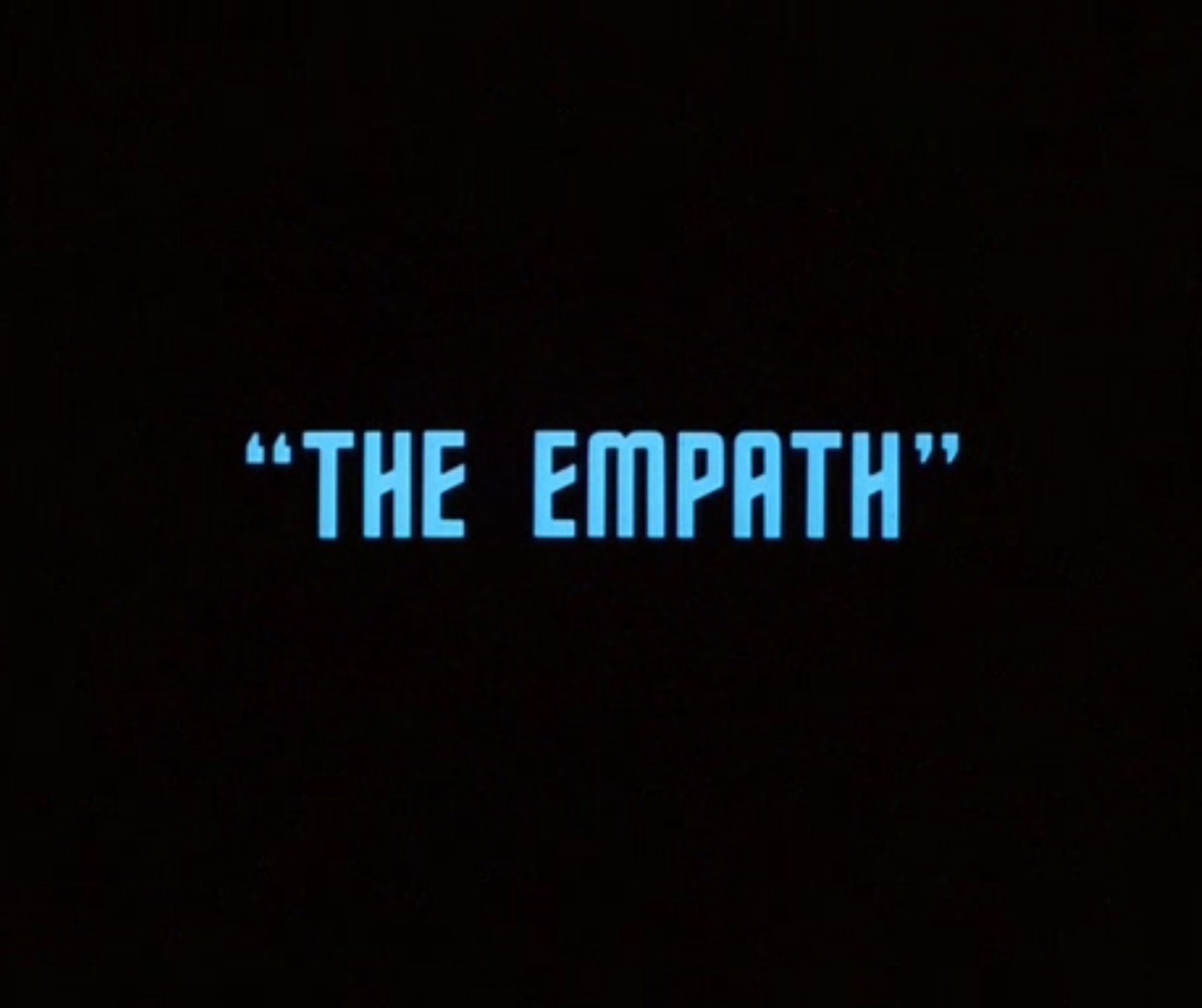
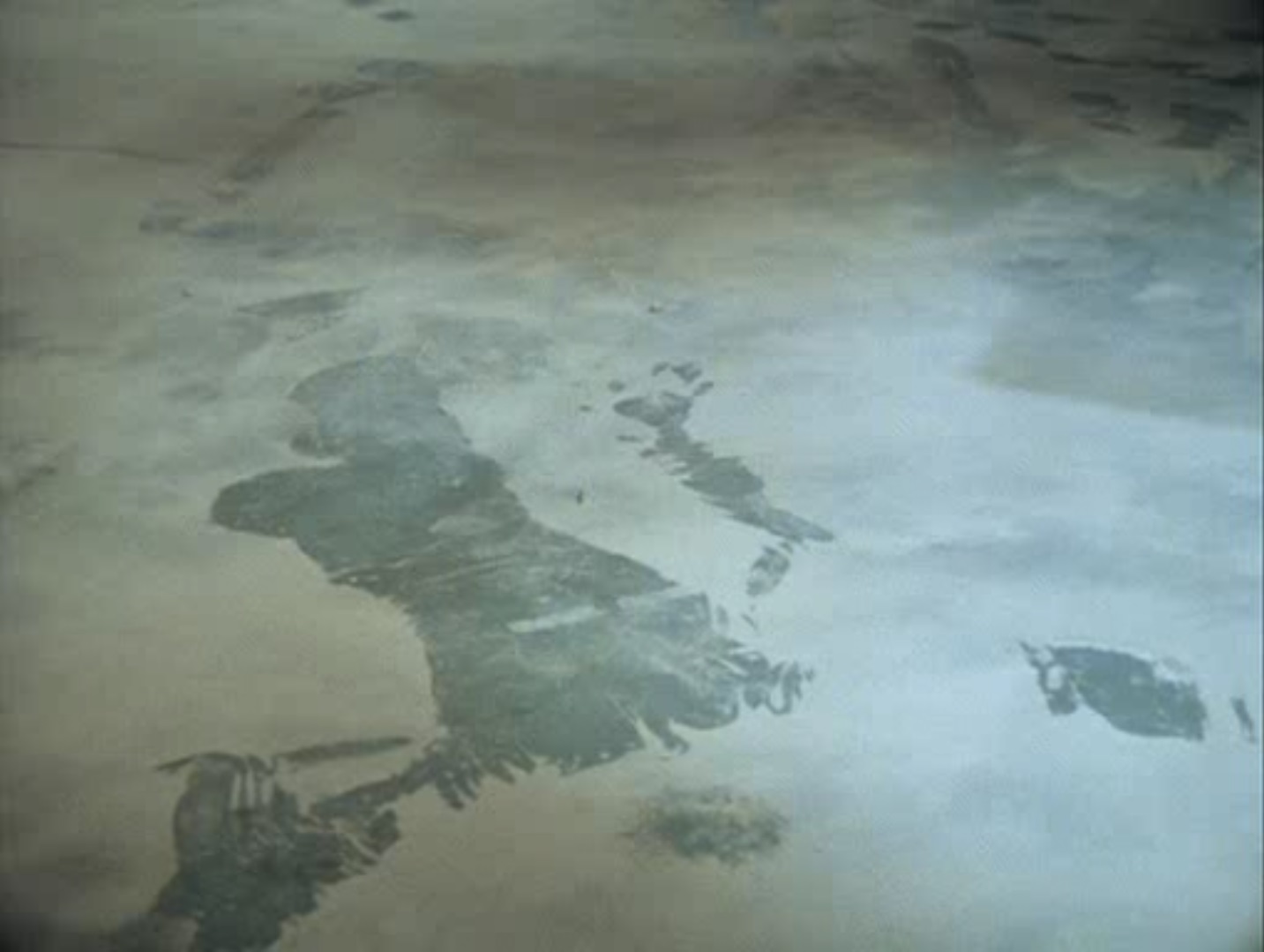
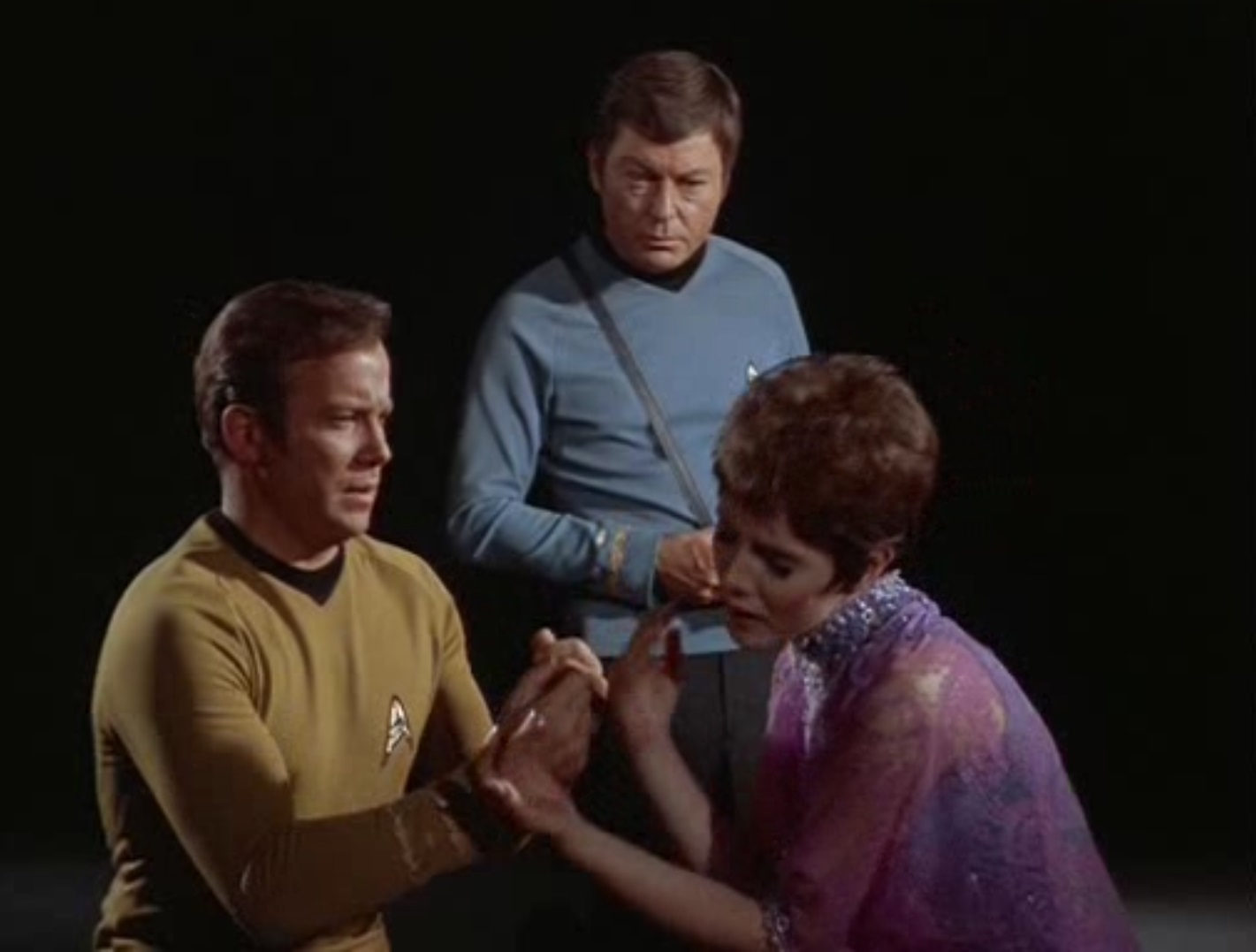
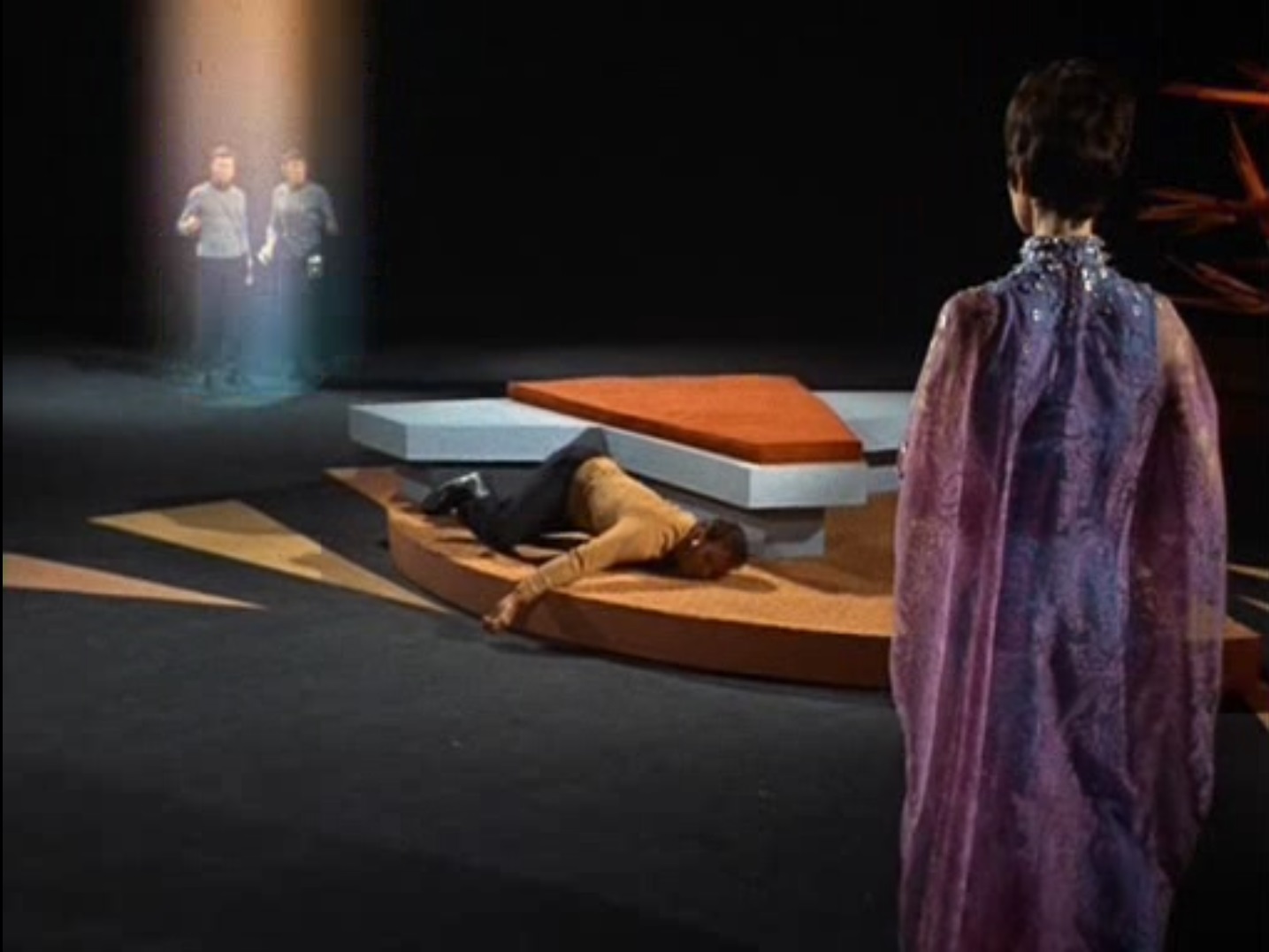

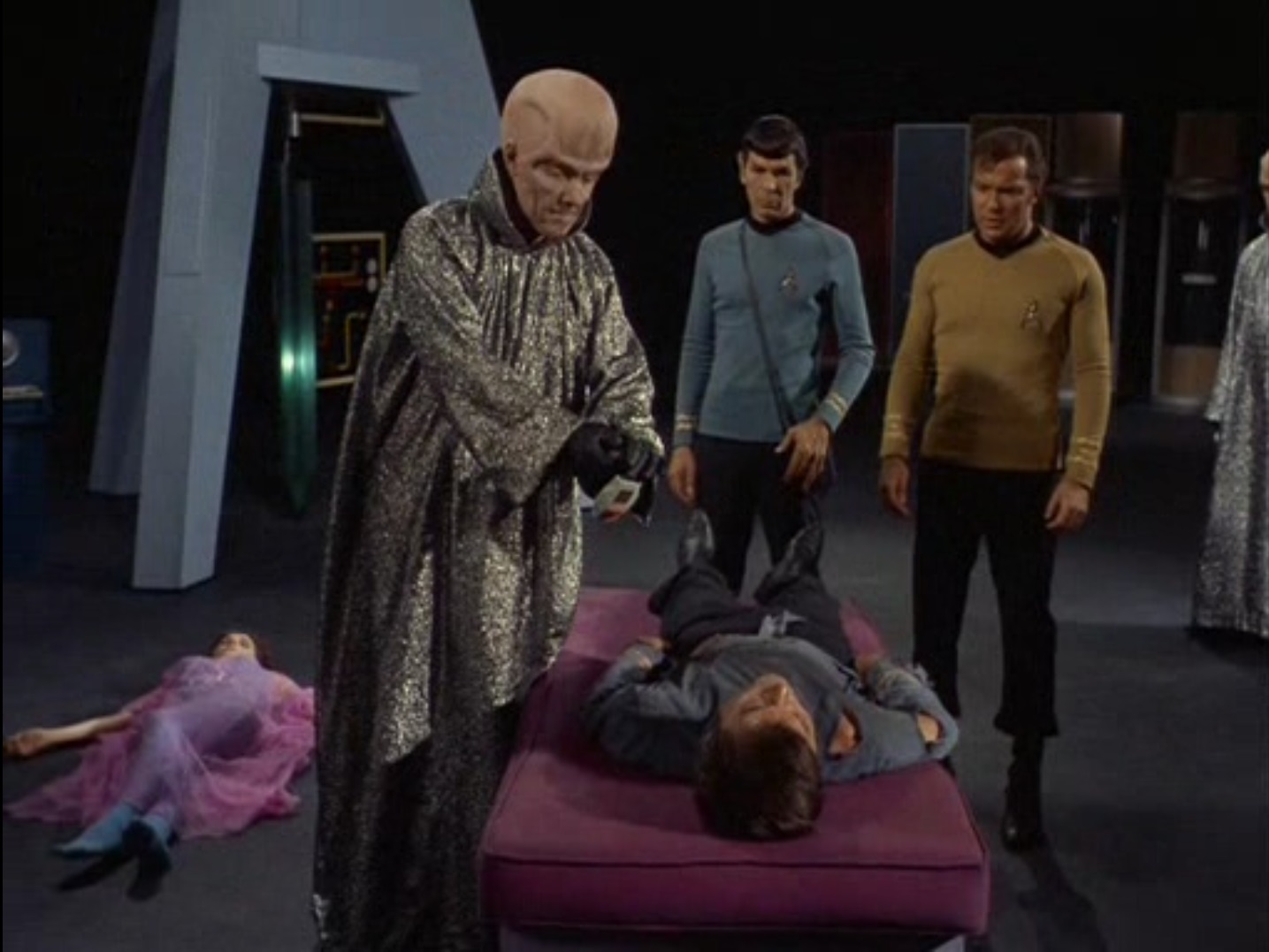
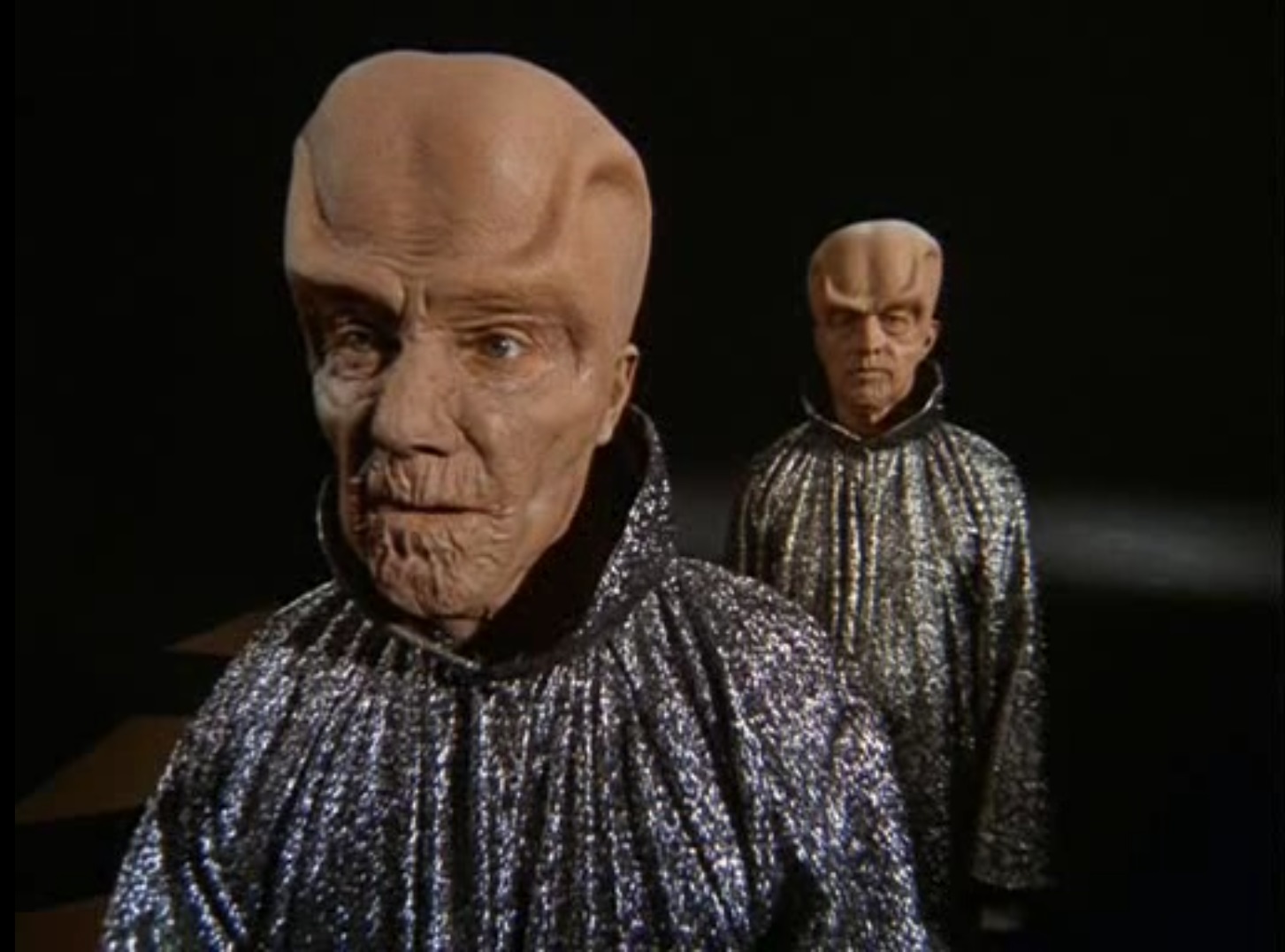
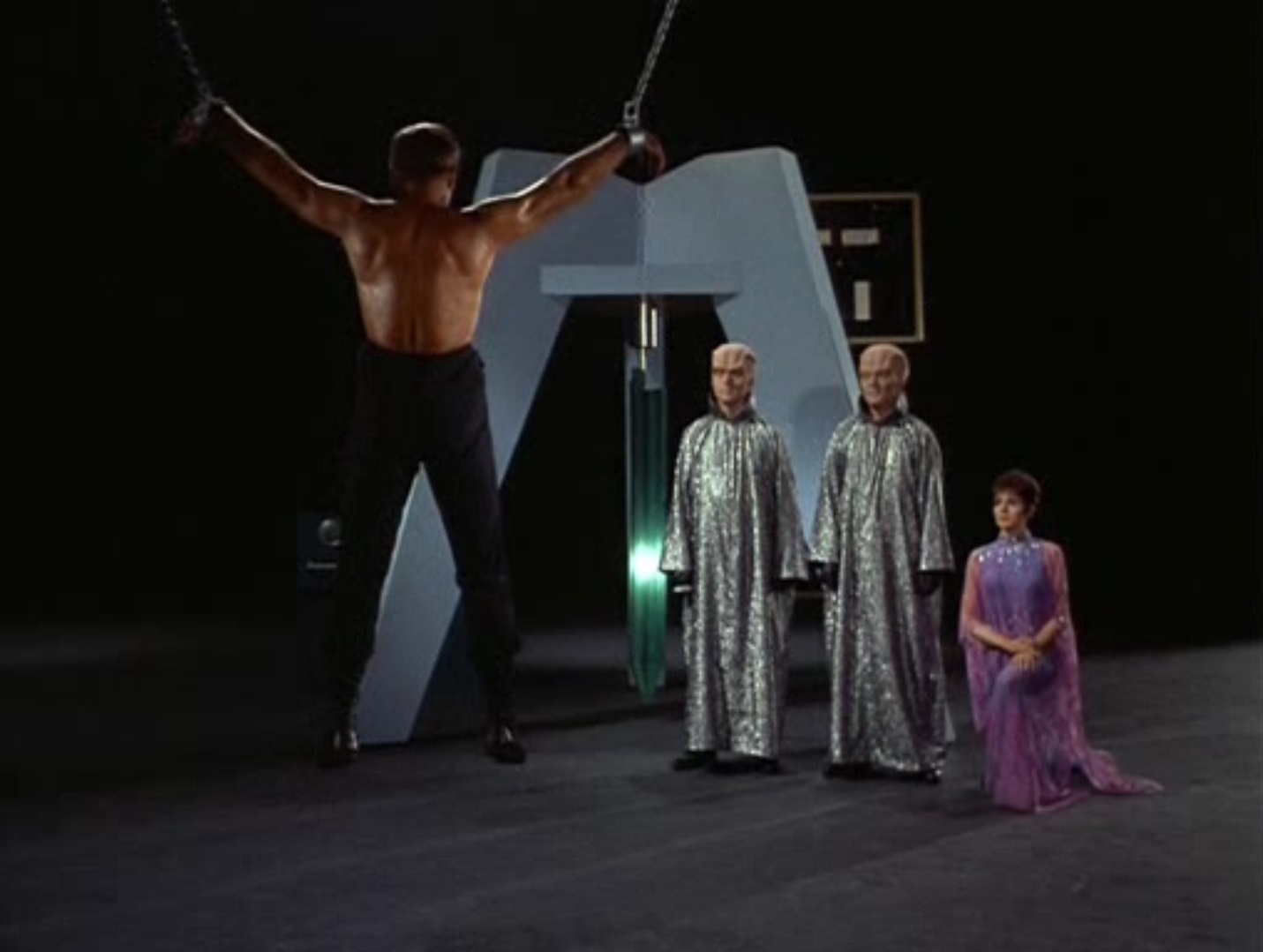
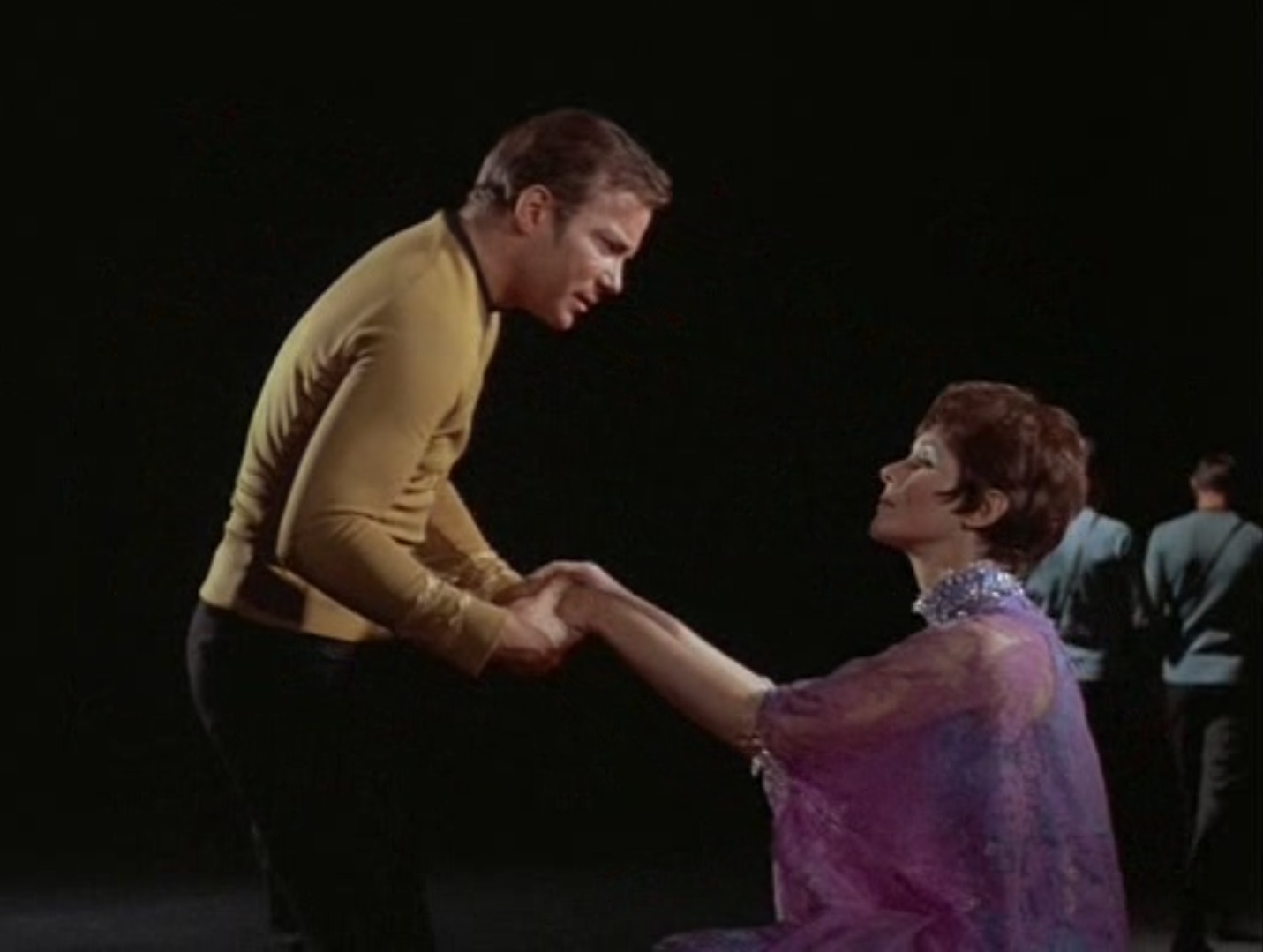

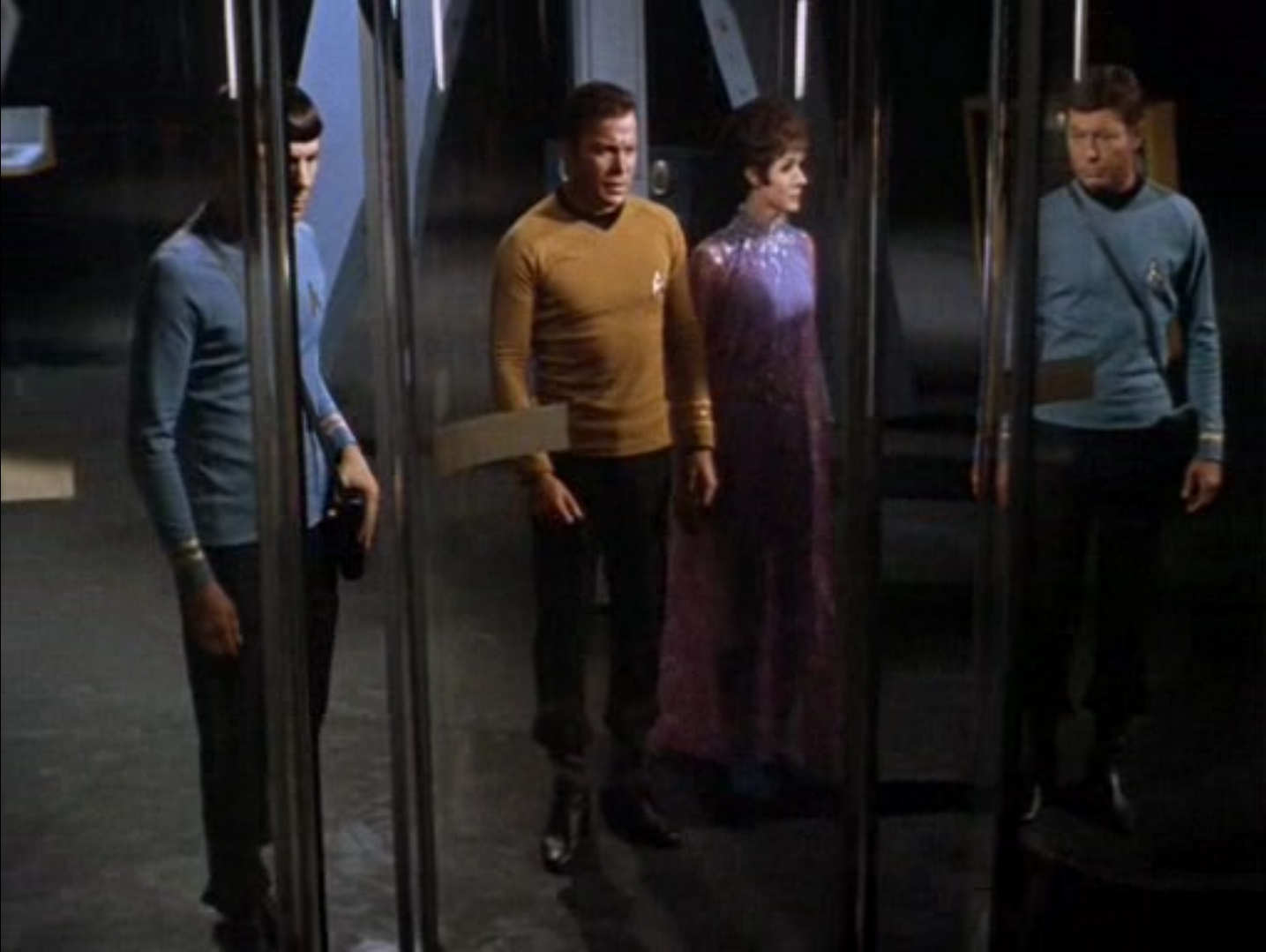
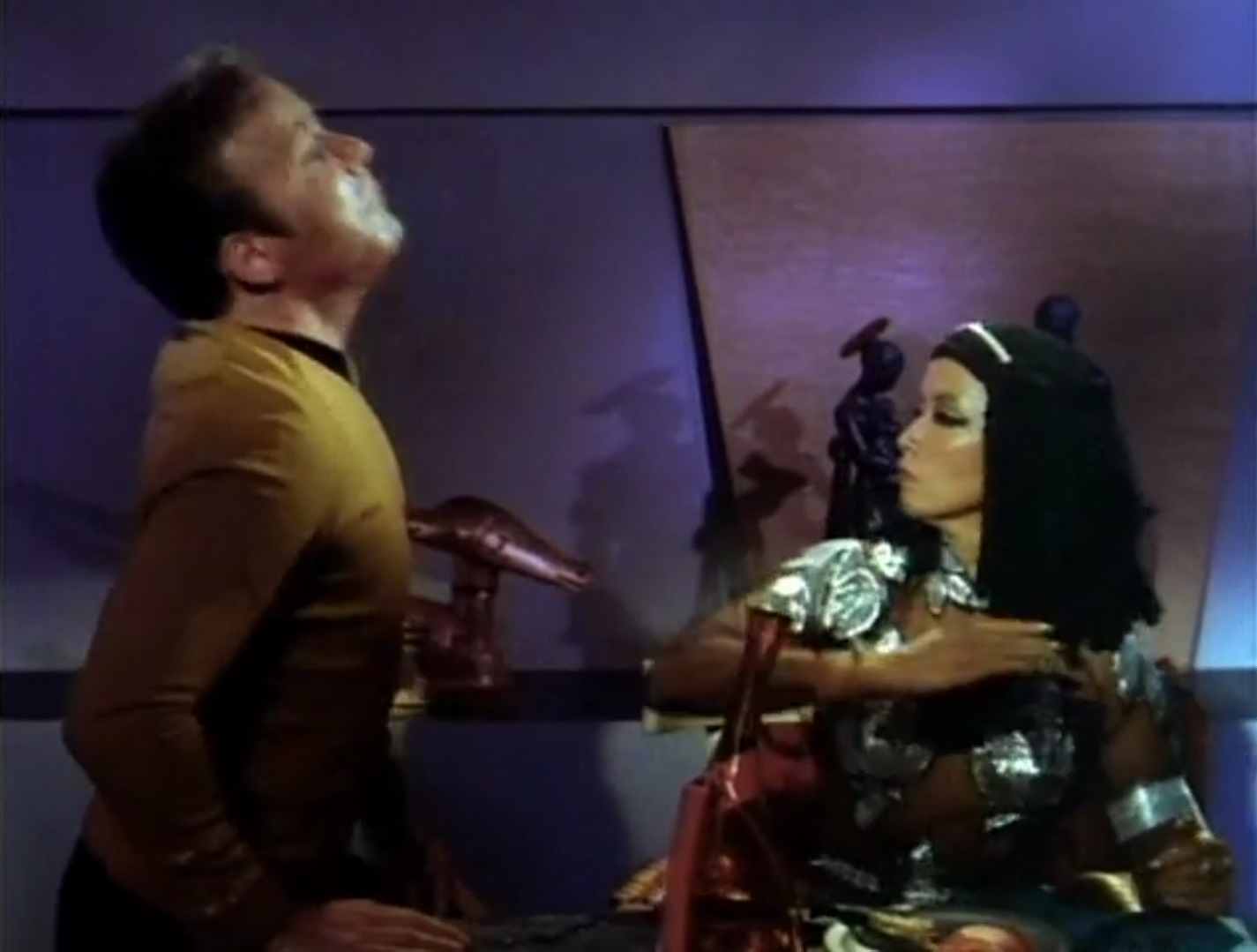
![[Nov. 22, 1968] Bound to thrill (<i>Star Trek</i>: "The Tholian Web")](https://galacticjourney.org/wp-content/uploads/2023/11/681122title-672x372.jpg)

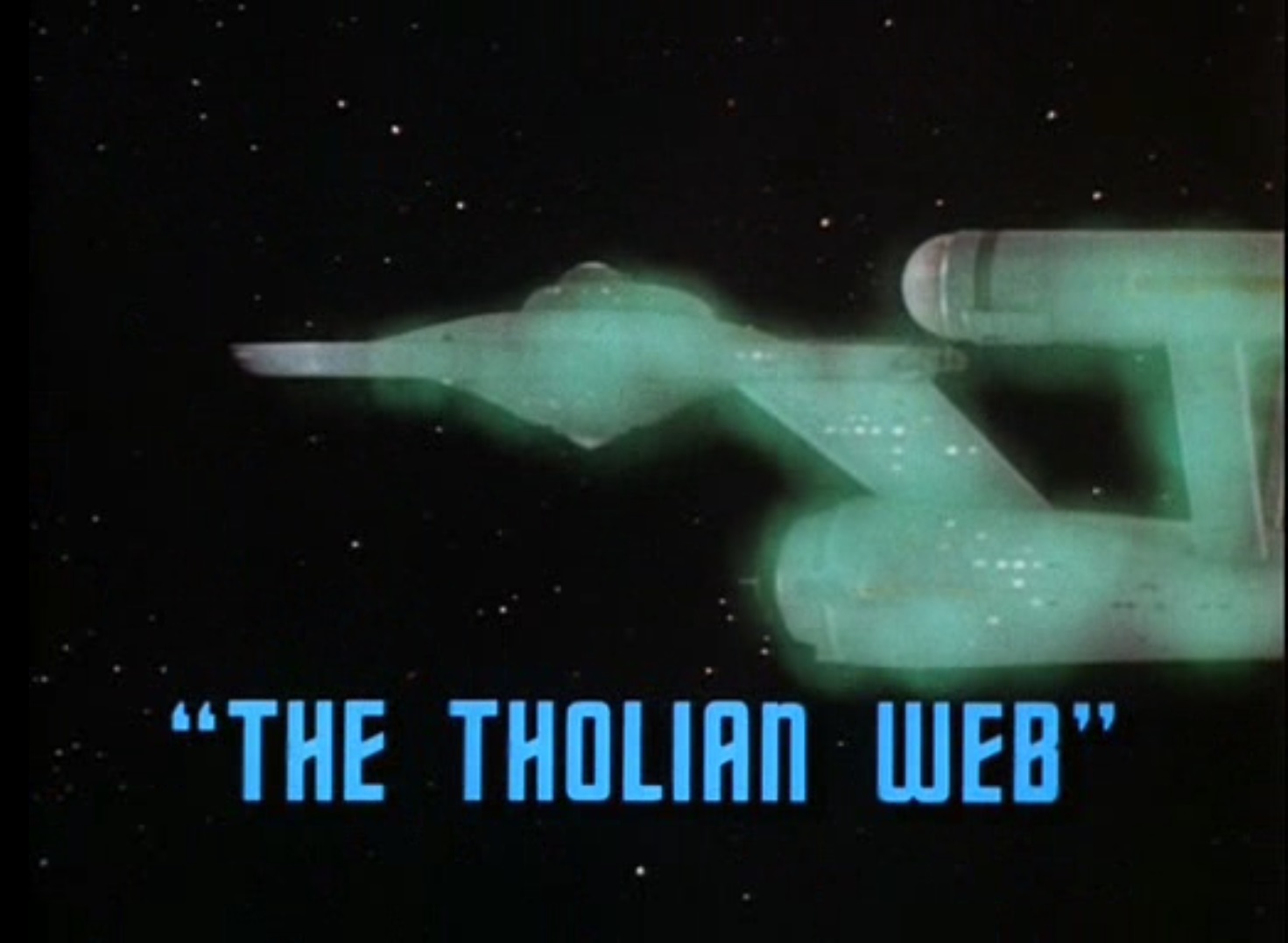













![[November 14, 1968] "'S'cuse me while I touch the sky!" (<i>Star Trek</i>: "For the World is Hollow and I have Touched the Sky")](https://galacticjourney.org/wp-content/uploads/2023/11/681114title-672x372.jpg)













